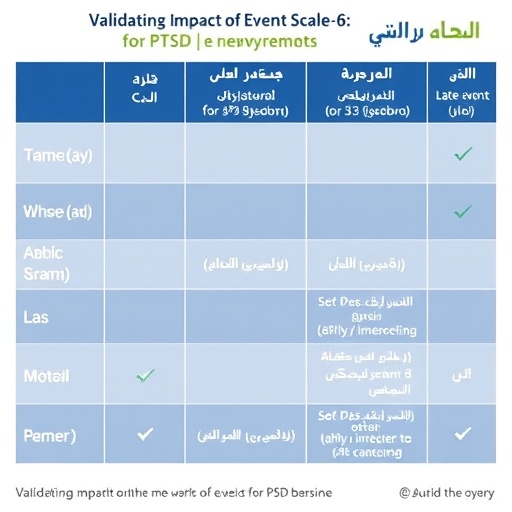In the recent study conducted by Hemade et al., the authors delve into the pressing issue of post-traumatic stress disorder (PTSD) among the Lebanese population, highlighting the importance of culturally relevant psychological assessments. PTSD is a mental health condition triggered by traumatic experiences, and it has been a significant concern in Lebanon, particularly given the historical and ongoing conflicts in the region. This comprehensive examination focuses specifically on the psychometric validation of the Arabic version of the Impact of Event Scale-6 (IES-6), a widely recognized instrument designed to measure PTSD symptoms.
The research showcases the necessity for mental health tools that resonate with the cultural and linguistic backgrounds of individuals affected by PTSD. The Arabic IES-6, through its structured questionnaire, seeks to identify the psychological burden carried by many in Lebanon. By tailoring the assessment to the Arabic language, the researchers aim to improve both the reliability of data collected and the therapeutic processes implemented in response to these psychological needs.
Utilizing a robust methodology, the researchers assessed a sample of individuals who have experienced varied traumas. The validation process included statistical analyses to determine the scale’s reliability and validity. These analyses demonstrated that the Arabic version of IES-6 effectively measures PTSD symptoms, making it a critical tool for clinicians and researchers alike in Lebanon and potentially in other Arabic-speaking regions.
Furthermore, the study emphasizes the iterative process of adapting psychological assessments across different cultures. Standardized tests may not always capture the nuances of emotional responses linked to specific cultural contexts, which is why local adaptations are vital. The authors utilized a combination of qualitative feedback from mental health professionals and quantitative data to refine the IES-6 for Lebanese populations.
The findings reveal significant insights into the prevalence and intensity of PTSD symptoms in Lebanon. Participants reported high levels of hyperarousal, avoidance, and re-experiencing, which are core symptoms manifested in individuals suffering from PTSD. The data collected through the Arabic IES-6 offers a window into the psychological state of many Lebanese citizens, shedding light on their collective trauma as they navigate everyday life amidst historical and socio-political challenges.
Moreover, Hemade et al. underscore the implications for mental health services in Lebanon. As the study reveals the extent of PTSD symptoms present in the community, it calls for more robust mental health support systems, including counseling and community-based interventions. It highlights the necessity for policymakers to prioritize mental health as part of broader health strategies, ensuring resources are allocated to address the mental health crisis exacerbated by ongoing socio-political instability.
The research also positions Lebanon within the broader global context of PTSD research, indicating that while the impact of trauma may be universal, the experience of PTSD is not. Through this work, the authors advocate for more culturally sensitive approaches to mental health, suggesting that similar studies should be conducted in other regions facing their own traumas. The sharing of knowledge gained from this research could contribute to global efforts to understand and treat PTSD across diverse populations.
In addition to practical implications, the authors also raise awareness about the stigma surrounding mental health issues in Lebanon. There remains a pervasive fear of social ostracization and misunderstanding of PTSD, which can hinder individuals from seeking help. The researchers argue that the normalization of mental health dialogue, alongside scientifically validated tools like the Arabic IES-6, is essential in reducing stigma and encouraging individuals to pursue necessary treatment.
Drawing attention to methodological rigor, the authors advocate for similar psychometric validation studies to be conducted in various cultural contexts. They emphasize that the process of validating assessments should not be viewed as a one-time task but rather as a continuous endeavor to ensure tools remain relevant and effective for diverse populations. This approach not only advances psychological research but also contributes to a greater understanding of the human experience in relation to trauma.
As Lebanon grapples with its mental health crisis, the research by Hemade et al. serves as a beacon of hope, underscoring that effective tools for understanding and addressing PTSD symptoms are available. The Arabic IES-6 is not merely a test but a lifeline for many, enabling healthcare providers to offer appropriate support and interventions tailored to the unique experiences of those living in Lebanon.
In conclusion, the work of Hemade and colleagues represents a vital step towards improving mental health outcomes in Lebanon. By validating the Arabic version of the IES-6, they have not only created a tool for assessing PTSD but have also paved the way for further research and discussion on mental health within the region. This study is an invitation for society to acknowledge the burdens of trauma, the importance of receiving help, and the necessity for mental health advocacy. As awareness grows, so too does the hope for healing within communities affected by PTSD.
Moreover, as public health initiatives expand, the translation of mental health resources into local languages will play a critical role. Such efforts will contribute significantly to the ongoing battle against the stigma associated with mental illness and empower individuals to seek care. Thus, Hemade et al.’s contributions are instrumental in fostering a more psychologically resilient society, ready to face both historical legacies and contemporary challenges.
Subject of Research: Psychometric validation of the Arabic version of the Impact of Event Scale-6 (IES-6) for PTSD in Lebanon.
Article Title: Measuring symptoms of post-traumatic stress disorder in Lebanon: psychometric validation of the Arabic version of the Impact of Event Scale-6 (IES-6).
Article References: Hemade, A., Hallit, R., Malaeb, D. et al. Measuring symptoms of post-traumatic stress disorder in Lebanon: psychometric validation of the Arabic version of the Impact of Event Scale-6 (IES-6). Discov Ment Health 5, 142 (2025). https://doi.org/10.1007/s44192-025-00226-1
Image Credits: AI Generated
DOI: 10.1007/s44192-025-00226-1
Keywords: PTSD, Arabic IES-6, psychometric validation, mental health, Lebanon, trauma, psychological assessment, cultural relevance, mental health services.




